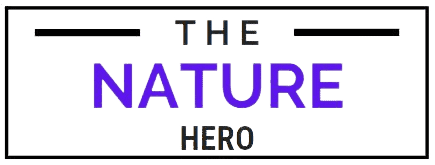Are you aware that OpenAI has discontinued Codex? Therefore, trying excellent AI code assistant tools similar to Codex may be a great time.
Read on to discover how these alternatives fare to Codex.
Table of Contents Show
What Is Codex And How Does It Work?
Codex AI or OpenAI Codex is a natural language processing (NLP) technology developed by OpenAI to generate custom codes.
Unveiled in 2021, it became an instant hit with programmers to create code responses, complete codes, and correct coding errors.
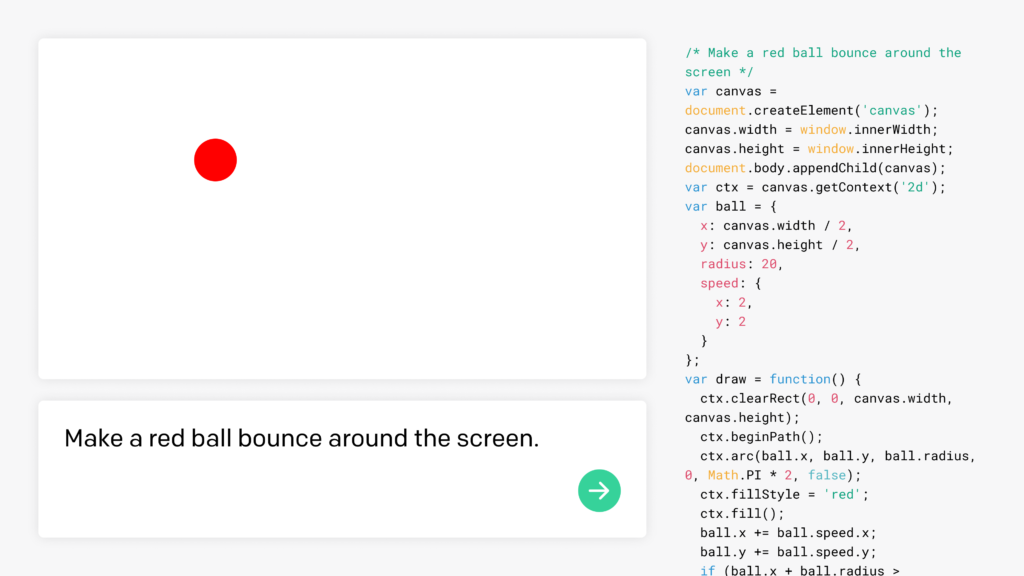
It was trained on a massive dataset of coding languages, including Go, JavaScript, Perl, PHP, Ruby, Shell, Swift, TypeScript, etc., and deep learning algorithms.
Therefore, users are less likely to access Codex as a standalone service.
Features Of Codex
Although it has been discontinued, Codex was known for some fantastic features, including:
- Code Generation: Codex AI can create code in multiple programming languages based on natural language input from users.
- Natural Language Processing: The tool can understand and respond to natural language questions, enabling users to interact with it using human-like language.
- Speed And Efficiency: Codex AI produces code more accurately and quickly, making it a valuable tool for developers.
- Integration With Development Tools: Codex AI is integrated with various development tools, such as GitHub’s Copilot, which allows developers to write code more efficiently.
- Customization: Codex AI can be customized to specific domains, enabling it to provide more relevant and accurate code suggestions for particular industries or topics.
Top 7 Codex Alternatives To Use In 2024
Although very helpful, Codex was older technology with limited features. Maybe it is why OpenAI decided to discontinue it.
Nonetheless, here are some excellent code assistant alternatives you should try.
1. Github Copilot
GitHub Copilot is an AI-powered code completion tool developed by GitHub in collaboration with OpenAI.
The tool is integrated into the Visual Studio Code editor so programmers can use the feature in conjunction with the code they are working on, which saves time.
It helps programmers write code more efficiently by providing intelligent code suggestions and autocompleting code snippets based on the code’s context.
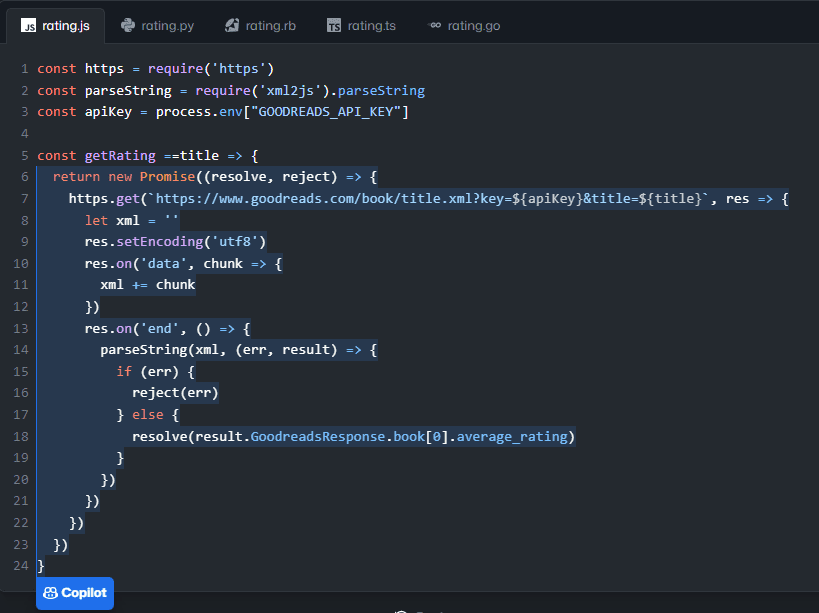
Moreover, you can use it to create a boilerplate, debug existing codes, generate test cases and assertions, and more.
Copilot uses OpenAI’s GPT-3 architecture to generate responses, but the reactions are limited to coding activities.
If you are wondering, Github Copilot is way more advanced and full of features than its predecessor, Codex.
Here is how GitHub Copilot fares to Codex.
| Copilot | Codex |
|---|---|
| GitHub Copilot can be integrated into VS Code editor to generate suggestions while working on the codes. | Codex works as a standalone API that can be used in various applications. |
| It is only available to selected users who have been accepted into the technical preview program. | It is available to anyone with access to the OpenAI API. |
| GitHub Copilot is a joint venture between GitHub and OpenAI. | Codex is solely owned and operated by OpenAI. |
| It is developed in close collaboration with the developer community, with feedback and input from users. | It was primarily being developed by OpenAI's research team. |
2. TabNine
TabNine is an AI-powered code completion tool from Codota that uses deep learning algorithms similar to GPT to provide intelligent code suggestions to programmers.
It is designed to work with various code editors and IDEs, including Visual Studio Code, Atom, Sublime Text, and IntelliJ IDEA.
It makes TabNine a better alternative to Codex and many other code completion tools.
Moreover, you can customize the tool to disable specific suggestions and fine-tune them for specific codebases.
Here is how TabNine fares to older code completion tools like the Codex.
| TabNine | Codex |
|---|---|
| TabNine integrates with a wide range of code editors and IDEs. | Codex works as a standalone API through the Open AI. |
| It can be customized to disable specific suggestions or to prioritize suggestions based on the user's coding preferences. | It can be fine-tuned for specific domains, providing more accurate and relevant suggestions for specific industries or topics. |
| Offers self-hosting capabilities via VPC or on-premises deployment. | It can only be accessed through OpenAI platform. |
| It uses less data than Codex AI, which can be beneficial to work with limited bandwidth or have data usage restrictions. | It is based on token system, where each token will have a set bandwith usage. |
3. GPT-CC
GPT-CC is an open-source version of GitHub Copilot based on GPT architecture, designed specifically for code completion tasks.
It was developed by researchers at the University of Hong Kong, EleutherAI, focused on developing large-scale language models.
One of the critical features of GPT-CC is its ability to generate code suggestions beyond simple code completion.
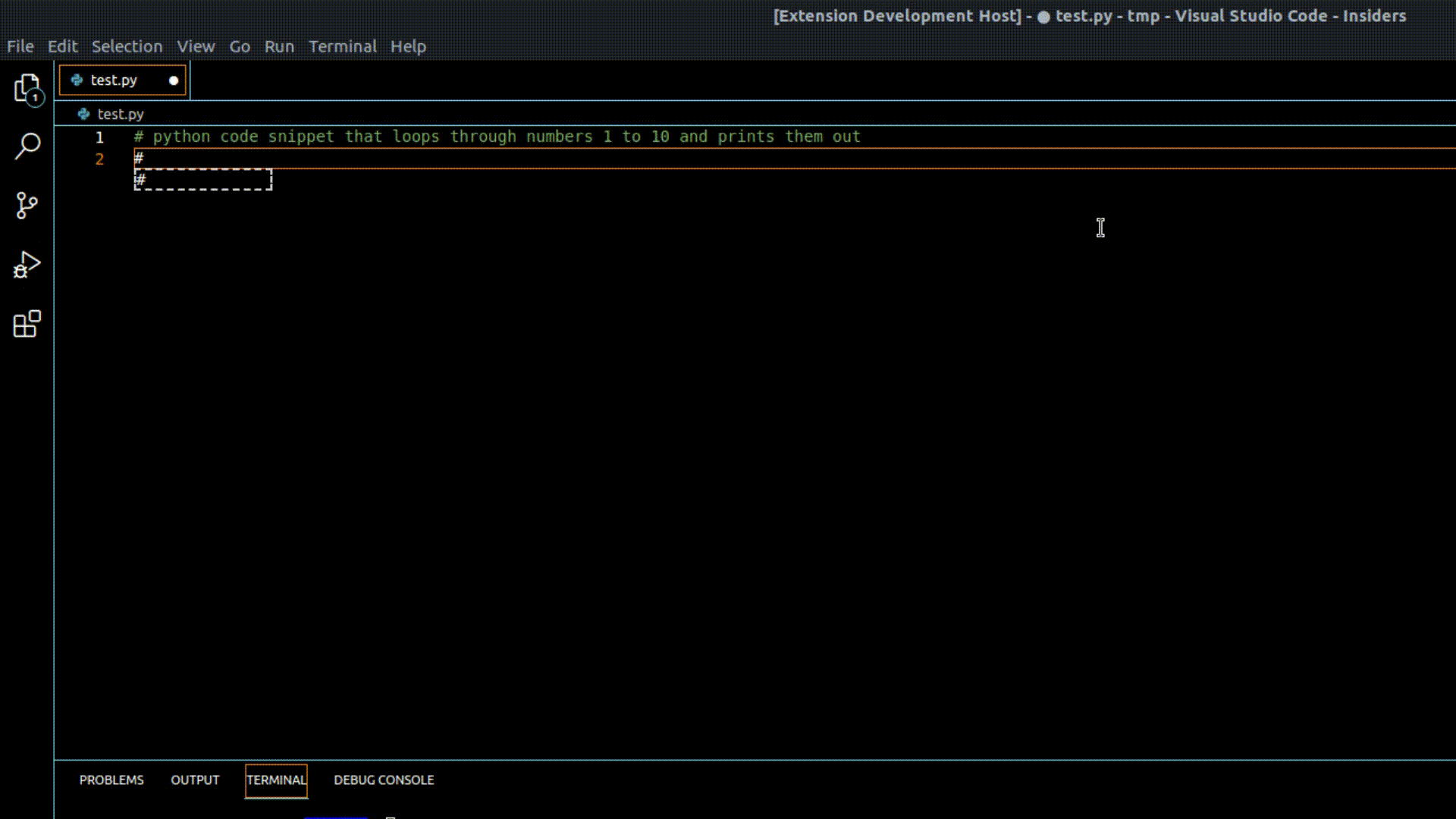
It can suggest entire functions, classes, and modules based on the written code, making it a powerful tool.
Here is how GPT-CC compares to Codex.
| GPT-CC | Codex |
|---|---|
| GPT-CC is based on the GPT architecture and NLP. | Codex uses a combination of transformer and neural network architectures. |
| GPT-CC is an open-source model, meaning it can be used and modified by anyone. | Codex is owned and operated by OpenAI, and access to the model is controlled by OpenAI. |
| It is highly customizable, allowing fine-tuning the model for specific domains or languages. | It can be can also be fine-tuned, but this requires access to the underlying code and infrastructure. |
| It supports a range of programming languages. | It supports a more limited set of programming languages. |
4. IntelliCode
Another excellent AI-assisted development that makes a perfect alternative to Codex is IntelliCode.
As the name suggests, it learns from individual developers’ code patterns and practices, improving its suggestions over time based on the developer’s coding style and preferences.
Intellicode also learns from code repositories on GitHub and suggests the most popular and relevant code snippets to the developer.
One exciting thing about IntelliCode is that it integrates with GitHub, allowing developers to collaborate on code and review pull requests quickly.
Therefore, it can make a valuable alternative to Codex in many ways.
Here are some unique differences between IntelliCode and Codex.
| IntelliCode | Codex |
|---|---|
| It provides code completion suggestions and refactoring recommendations for the programming languages it supports. | It can generate code in various programming languages, suggest codes, and improve existing codings. |
| It can learn from individual developers' code patterns and preferences to improve its code suggestions. | It can only be fine-tuned for specific domains and topics. |
| It supports a wide range of programming languages. | It supports a more limited set of programming languages. |
| Intellicode is developed by Microsoft and is integrated into their VS and Visual Studio Code IDEs. | Codex AI is developed and owned by OpenAI and is accessible through the OpenAI API. |
5. SourceAI
SourceAI is a code assistant tool based on GPT-3 model, designed to provide intelligent code suggestions.
It uses machine learning algorithms to analyze the code in real time and generate intelligent suggestions for the following line of code, saving time and effort.
Developers can use it for code completion, refactoring, and optimization. Additionally, it can detect and correct errors in the code.
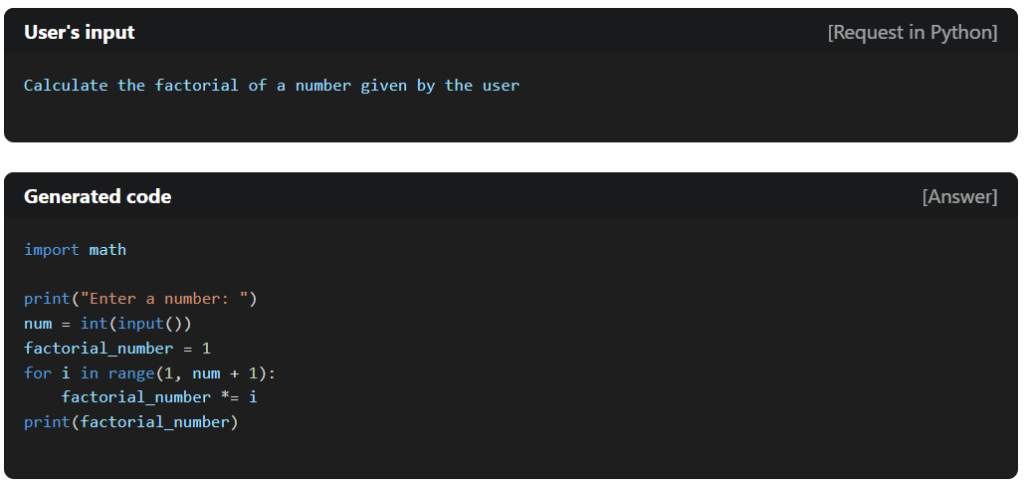
It is a versatile tool that supports multiple programming languages, including Python, Java, and JavaScript.
Additionally, it can be integrated with various IDEs, such as Visual Studio Code, Atom, and Sublime Text.
Here is how Source AI can become your best alternative to Codex.
| Source AI | Codex |
|---|---|
| It features code completion, refactoring, optimization, error detection, and suggestions for code snippets and templates. | It offers code generation, natural language processing, speed and efficiency, customizability, and integration with IDEs. |
| It offers code completion and other suggestions for specific programming languages such as Python, Java, and JavaScript. | It is been designed to generate code in various programming languages. |
| It offers a free community edition with limited features, as well as paid plans for individuals and businesses. | It is currently only available as a paid service for businesses. |
6. DeepCode
On the list is a powerful AI-powered code analysis platform, Deep Code, which provides unique code assistant features.
Developed by Swiss developers in 2016, it uses machine learning algorithms to analyze and identify potential errors, analyze data flow, process natural language, and improve code quality.
Here are some of the features of Deepcode.
- Improved Code Quality: It detects and highlights potential issues in code.
- Time-Saving: It can identify potential problems much faster than manual code reviews.
- Comprehensive Analysis: Covers many potential issues, including security vulnerabilities and code smells.
- Integrations: It can integrate with popular development tools such as Visual Studio Code and GitHub.
However, it is not just an analysis tool; it specializes in multiple programming languages and improves the overall coding experience, making it very different from Codex.
| DeepCode | Codex |
|---|---|
| It is a code analysis tool that identifies potential errors and vulnerabilities in code. | It is a code generation tool that can write code based on natural language inputs. |
| It supports a wide range of programming languages, including Java, Python, JavaScript, C++, and more. | It only supports a smaller set of languages. |
| It can be integrated with popular IDEs like Visual Studio Code and GitHub. | It is integrated into GitHub's Copilot, allowing developers to code more efficiently. |
| DeepCode offers both free and paid plans. | Codex AI is currently only available through GitHub's Copilot. |
7. Code Whisperer
Code Whisperer is a more recently developed code assistant tool developed by Amazon.
It can generate whole lines and fully functional code as an AI coding companion through your preferred IDEs.
In fact, it was developed by Amazon to overcome the limitations of previous code assistant tools.
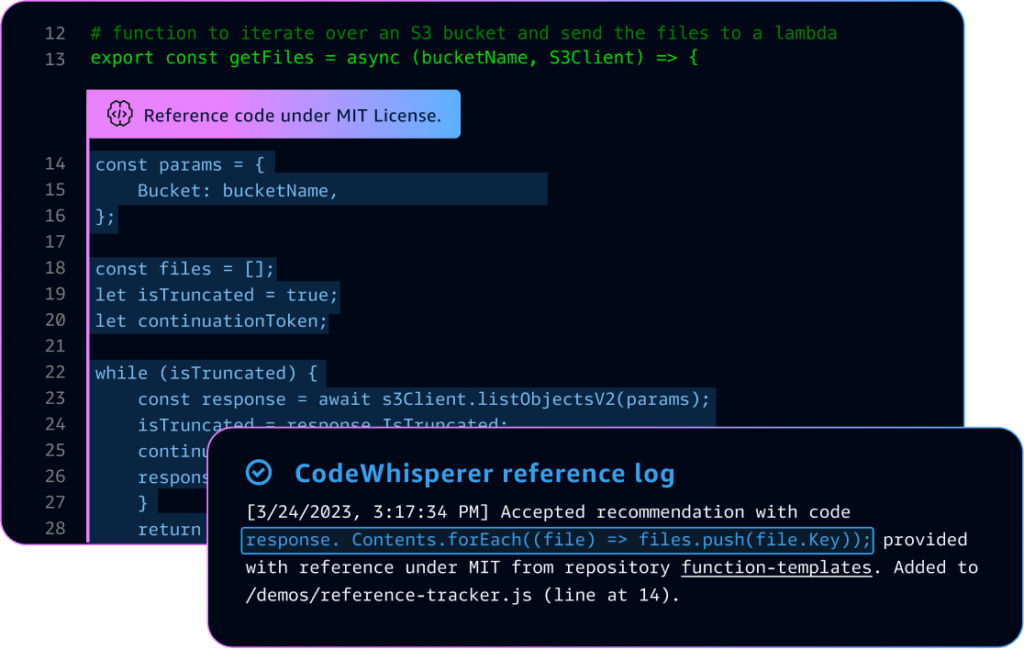
Moreover, it is trained on billions of lines of code retrieved from open-source repositories, including Amazon repositories, API documentation, and GitHub, which makes it quite robust.
Code Whisperer can become a great chance for developers looking for something unique.
| Code Whisperer | Codex |
|---|---|
| During the preview period, developers can use CodeWhisperer at no cost. | Codex is only available through OpenAI API obtained through paid package. |
| The code recommendations are based on different repositories and libraries. | The code recommendations are obtained from GitHub and GPT library. |
| It is most efficient when user input is short and directed to discrete tasks so that no single function is too long. | It can generate, improve, correct, and complete codes. |
The Bottom Line
Some Codex alternatives can undertake and autocomplete complex tasks, saving developers much time.
Now that Codex is discontinued, you should adopt many great alternatives that offer more unique features.
Let us know in your comment which code assistant tool worked best for you and in what aspects.
Frequently Asked Questions
Can I Use IntelliCode With Languages Other Than C# And Python?
You can use IntelliCode with several languages besides C# and Python, including TypeScript, JavaScript, Java, and XAML.
However, the level of support may vary depending on the language and the specific features you are using.
Can TabNine Generate Code In As Many Languages As Codex AI?
TabNine currently supports more than 50 programming languages, which is lesser than Codex AI, but TabNine offers more accuracy and speed.
How Customizable Is Source AI Compared To Codex AI?
Source AI is highly customizable compared to Codex AI, which can be trained on custom datasets and tuned for specific use cases.
In contrast, Codex AI does not currently offer the same level of customization.
